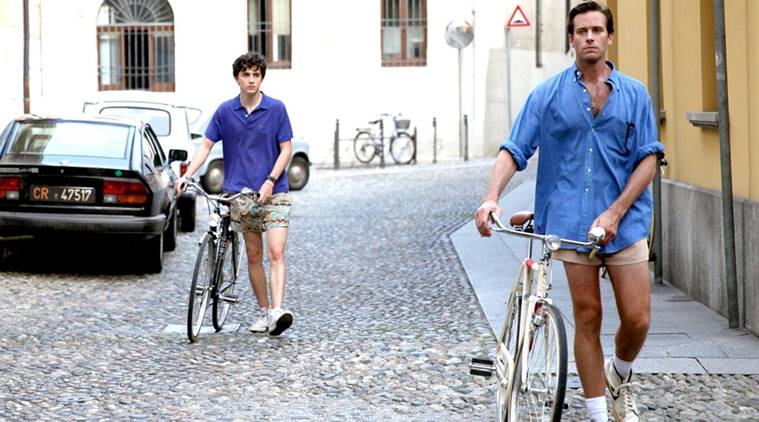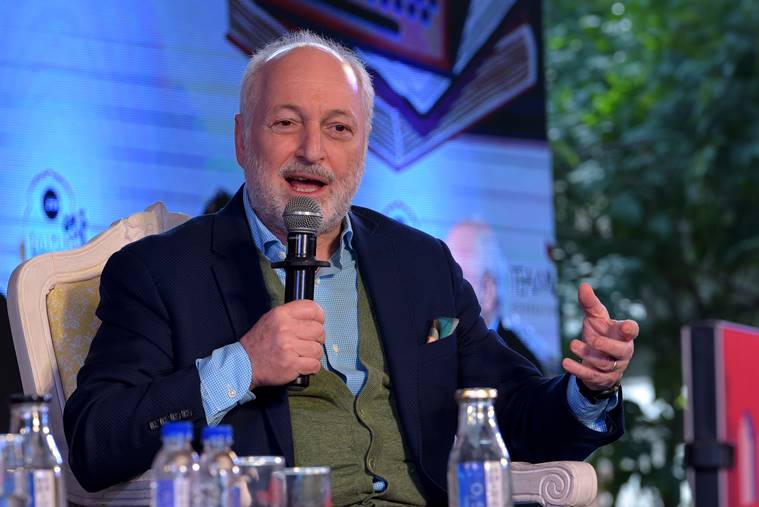
What did you think of the film when you first watched Call Me By Your Name (2017)? Did you think it would turn out like that?
No. I was surprised to see how many scenes were taken from the book, word for word. James Ivory did a great job with the screenplay; one of the things I was very happy about was that the interiority of Elio was captured beautifully, without any voiceover. That would have been so heavy-handed.
You’re here at the Zee Jaipur Literature Festival, but you have repeatedly said that you don’t read contemporary writers. Why?
I think the word ‘fiction’ is very special; it’s an aesthetic mode unto itself. Every author is aesthetically different. But I find that most contemporary prose is simple, and, you can hate me for saying this, journalistic. So it does not try to achieve the complications that art aspires to. Now, art doesn’t always necessarily achieve it, but it aspires to reach a complicated state of reality. I find that the language used in contemporary fiction is usually trivial.

You mean pedestrian?
Plodding. Flat-footed. Some books will make you laugh or cry, but what they fail to achieve is a level of elevation that you need in any kind of artistic endeavour. I don’t want to move any of my readers. I want them to say, ‘I thought this all my life but I never quite considered or articulated it. Thank you for saying the words.’ It’s that moment when a reader says, ‘You’ve introduced me to who I am’ — that’s when I’ve done my job. Journalists cannot do that. Your language and aspirations are completely different. What you do is reportage and the last thing I’m interested in are facts.
In talking about fiction as art, you have made a case for people to read the classics. When did you start to read books and which of these classical titles did you grow to love?
I began reading early in my life. It happened because of my father, he was a great reader and a very serious one at that. He was a businessman but he wasn’t a superficial person; he also wanted to become a writer. So I learned from him that language was the most sacrosanct thing, and must be used to achieve a certain level of elevation, without being artificial or conceited.
But I started reading because I hated Italy. We arrived there from Egypt as refugees in 1965. I was 14-15 years old, and suddenly, I didn’t want to face the world. At that point, I used to buy a book every week and I would spend seven days reading. I only bought the classics, because I didn’t have the money to dabble with contemporary writers. I was taking a chance with the classics, too, but I liked the fact that I was reading serious novels. To put it clumsily, I was entering a space that had permanence written into it. And everything I knew since I had lived in Egypt was provisional, tentative. My home and my beliefs were temporary, all my aspirations were temporary. So the classics were a world — where no matter what happened — had lasted.
When you read Fyodor Dostoevsky at that age, you realise that human beings are fundamentally not coherent. They are the most inconclusive and contradictory assemblage of entities. To me — a Jewish boy who is not really Jewish, I live in a Catholic country but I don’t like Catholics, I was born in Egypt but I didn’t want to be an Egyptian — nothing about me makes sense! But here’s a writer who takes that sentiment and gives it amplitude, and I was at home with that.
Speaking of home, your first book, Out of Egypt (1995), was published in your 40s to critical acclaim. You’ve said that it took you so long because you weren’t confident about your work. How did you go from that state to writing a memoir, which is such an unforgiving genre in some ways? It’s almost like taking your clothes off in front of the world.
No, you let people think that you’re taking your clothes off. You’re undressing your readers, but, usually, I’m kind enough to help them put their clothes back on (laughs).
It didn’t take courage, it took a degree of craziness. English is my second language, so I was never confident in it, and yet, it is the only language I know how to write in. I’ve always had a foreign person’s inflection in my English, and I needed to get that out of my system — otherwise, I wouldn’t sound like an English-language writer.
But that’s what so many readers loved about Call Me By Your Name (2007) — the prose didn’t read like the English that one has become so habituated to.
It wasn’t American or from contemporary Britain. I think it’s what all writers do — we invent the language we write in. We have to, and it must sound right. Until I was able to do that, I didn’t publish.
Your last novel, Enigma Variations (2017), has Paul, a sexually-fluid character like Elio. What is it about these characters that excites you as a storyteller?
Paul does not excite me, some of the other characters in the novel do. But what excites me are the characters they desire. Elio may be young at 17, but he’s got the wisdom of a 25-year old man; he’s open about his suffering, his angst and desires.
It’s not love that excites me as a writer, it’s wanting. We want to want other people. Sometimes, you see somebody’s shoulders and you want to touch it. You don’t know what it is but you want to kiss it. You look at another person, their entire identity, you don’t know what you want from them but you want them. So how are you going to tell them that? That’s difficult, and that’s what I love — that moment of extreme despair that comes with wanting. Because I’ve known that feeling very often in my life, and I look for ways to repress it because it doesn’t go anywhere.
But we mustn’t kill desire, or wanting: Elio’s father tells us that so eloquently in the latter half of the book, and in one of the most moving scenes in the film.
Yes, he does, and so I don’t ever kill it. I’m such a liar (laughs). People sniffle during that scene and I can’t ever understand why.
Because Elio’s father urges him to recognise the beauty of his friendship with Oliver and that wanting need not be snuffed out, regardless of the pain it brings along?
Yes, that’s what my father told me, too; Elio’s father is based on him. ‘Why are you trying to pretend you don’t feel it? Just let it linger and don’t pretend you will move on.’
You don’t use a lot of descriptions in your prose. You want to take us into your mind but you don’t seem to be too interested in your surroundings…
There are moments when I describe a landscape, but I’m interested in how it feels. What is the sensual coefficient of that place? I live in my interior world, but I’m aware of the beauty of the exterior world. If it’s summertime in Italy and it’s hot, I don’t want to tell you about what the trees did; I prefer to describe the smell of coffee in the afternoon. In Call Me By Your Name, a man with a whetstone arrives every Wednesday to sharpen the knives, and it’s a sound you can hear in your nap, and I find these moments are more real to me.
You’re writing the sequel to the novel. Did you feel any pressure to write it after the film’s success?
I didn’t. I wanted to return to certain moments in the lives of the characters. Elio has another experience in the sequel, and it’s going to be very nice, except for one moment when the man tells him, ‘I know you don’t belong to me. I know you belong to somebody else. I will hold my place for as long as this goes.’
In parts, Call Me By Your Name reads like a philosophical treatise about youth and beauty. Is youth beauty?
No, I haven’t written it like that. I don’t think youth is beauty — desire is beauty. It is everlasting, it has no age. If you take that away from my life, I’m dead.